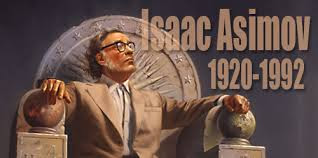[NOTE: I originally wrote this post a year ago and decided to update it in order to add the quote from and link to Asimov's article in the January 21, 1980, Newsweek, A Cult of Ignorance, which, with the current political atmosphere in the United States, is even more important today than the day he wrote it.]
Today would be Isaac Asimov's 97th birthday.
When I was in middle school and high school, Asimov was one of my most important teachers. This isn't to say that my Chicago Public Schools teachers didn't do their best to get this difficult-to-educate student motivated to learn...but Asimov did it better.
It was his science, not his science fiction that started me on the road to Asimov fanhood. I began reading his science essays some time in the early '60s.
I had discovered science fiction when I was in middle school and started buying pulp sci-fi magazines. One of them, The Magazine of Fantasy and Science Fiction (which has been in continuous publication since 1949), had science articles by Asimov. After I read one I searched the magazine monthly for Asimov, not science fiction.
I learned science from this reading, and as the years passed, I also learned more about Asimov the writer, and Asimov the person. He was a Renaissance man...a voracious reader and writer, knowledgable in dozens of academic areas, not just science. He taught me sociology, psychology, literature, history, philosophy, and religion. His books and articles were the ones which kept my interest...not my textbooks.
When I took science classes, especially biology and chemistry, I remember thinking that I was a real scientist, like Asimov. It's interesting that in my generally unsuccessful high school career, the science classes were the only ones I consistently did well in. [It's also likely that my father, with his Ph.D in Chemistry from the University of Chicago, influenced my interest and ability in science as well.]
Here then, in honor of his 97th birthday, are some of Isaac Asimov's quotes.
~~~
• A little less than two month ago, the United States ended it's quadrennial Presidential election cycle. This particular campaign, and its aftermath (the election and subsequent cabinet appointments, for example), reminded me of Asimov's article about anti-intellectualism called,
A Cult of Ignorance, by Isaac Asimov. Newsweek, January 21, 1980
It’s hard to quarrel with that ancient justification of the free press: “America’s right to know.” It seems almost cruel to ask, ingenuously, ”America’s right to know what, please? Science? Mathematics? Economics? Foreign languages?”The complete article, A Cult of Ignorance, by Asimov,
None of those things, of course. In fact, one might well suppose that the popular feeling is that Americans are a lot better off without any of that tripe.
There is a cult of ignorance in the United States, and there always has been. The strain of anti-intellectualism has been a constant thread winding its way through our political and cultural life, nurtured by the false notion that democracy means that “my ignorance is just as good as your knowledge.”
• Even as a professional, Asimov knew that discovery did not always follow expected paths. New discoveries sometimes just happen. The "teachable moment" is not something teachers plan. It, also, just happens.
• In an interview with Bill Moyers, Asimov asserted that people think of education as something you finish. Good teachers understand that learning is something that needs to continue throughout one's life.
Asimov made his statement as a criticism of the current education system. Graduation makes education a "rite of passage" and many think that once they graduate, they're done. In contrast, Asimov considered learning to be a life-long pursuit.
• In 1989 Asimov spoke about the greenhouse effect and how it can have an impact on the Earth. Listen starting about 1:30...[to about 7:00]. If he were still here his voice would surely be raised in alarm. The idea that humankind (Americans, at least) is denying real science in order to add to the profits of fossil fuel companies is the height of folly. My guess is that he would have choice words for the ignorance that seems to have enveloped the nation.
We are facing problems that transcend nations...
• Asimov taught himself to read before he went to school...and he graduated from high school at age 15. He went on to earn a B.S., an M.A. and a Ph.D. in chemistry from Columbia University. He left us with more than 500 volumes filled with his ideas, imagination and knowledge.
The saddest aspect of life right now is that science gathers knowledge faster than society gathers wisdom.
• For more on Asimov...
My favorite non-fiction works by Asimov were his articles in The Magazine of Fantasy and Science Fiction. Those have been collected into quite a few books. My favorite Asimovian fiction writings are two short stories which later grew into novels: Nightfall, and The Ugly Little Boy.
###




No comments:
Post a Comment